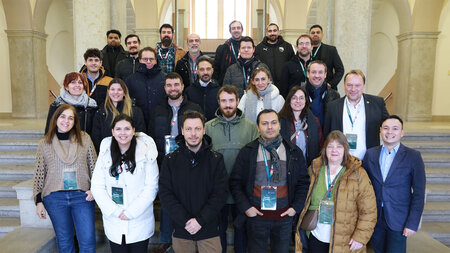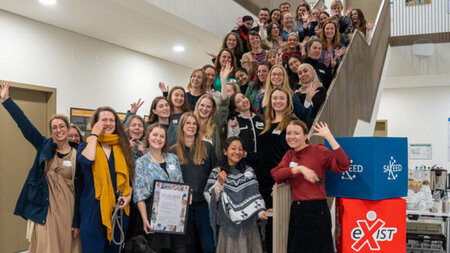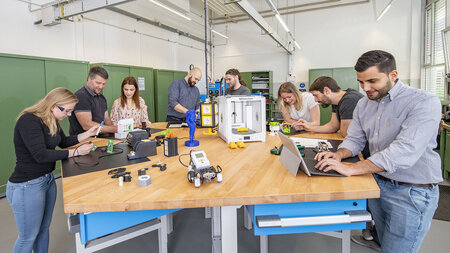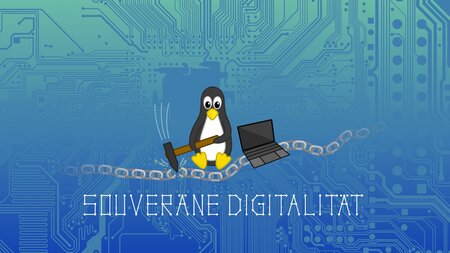Informatik-Kolloquien
302. Informatik-Kolloquium
Hochschulöffentliche Vorträge
Dr. Florian Röhrbein
Forschungsvortrag: "Neurorobotics: Past projects and future prospects"
In my presentation I will give an overview on my work in the field of brain-inspired
robotics, its relation to the state-of-the-art and possible future directions at TU Chemnitz
Lehrvortrag: "Supervised vs. unsupervised neuroinspirierte Methoden für Robotik-Anwendungen"pan>
Nach einer kurzen Einführung in die Begrifflichkeit und deren Kontext, wird ein Überblick
gegeben über verschiedene Lernverfahren, die sich im Bereich des überwachten und des
unüberwachten Lernens etabliert haben. Anwendungsgebiet ist dabei der Bereich der Robotik.
10:30 Uhr
Prof. Dr. Elmar Rückert
Forschungsvortrag: "Neurorobotic Motor Skill Learning"
The challenges in controlling anthropomorphic robots, understanding human motor control, and in brain-machine interfaces are currently converging. Modern anthropomorphic robots with their compliant actuators and various types of sensors (e.g., depth and vision cameras, tactile fingertips, full-body skin, proprioception) have reached the perceptuomotor complexity faced in human motor control and learning. While outstanding robotic and prosthetic devices exist, current algorithms for autonomous systems and robot learning methods have not yet reached the required autonomy and performance needed to enter daily life.
In my talk, I discuss state of the art probabilistic inference implementations in neural models that can be used to plan and predict complex motions of humans and robots. The models can handle partial observable, missing data and are robust to sensor noise, which is demonstrated in challenging robotic planning studies. In robot motion planning experiments, I demonstrate how motion trajectories can be trained through reinforcement learning and how state transition models can be learned through kinesthetic teaching. The model can adapt in real time within few seconds to obstacles or changes in the dynamical system through intrinsic motivation learning and enables powerful model-predictive control implementations in real robots.
Lehrvortrag: "Die Essenz von KI Lernmethoden"
Wir Menschen sind in der Lage unter widrigen Bedingungen z.B. bei eingeschränkter Sicht, oder bei Störungen komplexe Vorgänge wahrzunehmen, vorherzusagen und innerhalb von wenigen Millisekunden zusammenhängende Entscheidungen zu treffen. Mit dem zunehmenden Grad der Automatisierung steigen auch die Anforderungen an künstliche Systeme. Immer komplexere und größere Datenmengen müssen verarbeitet werden. Mit gängigen KI Ansätzen stoßen wir aufgrund dieser Probleme an Grenzen, die z.B. im Bereich des autonomen Fahrens nicht ausreichen, um ein sicheres autonomes System zu entwickeln.
In diesem Vortrag lernen sie die grundlegende Lernmethoden ‘supervised’, ‘unsupervised’, ‘semi-supervised’ und ‘reinforcement learning’ kennen und können diese anwenden. Um die benannten Grenzen zu überwinden kombinieren aktuelle Forschungsarbeiten diese grundlegende Lernmethoden. Zwei dieser innovativen neuro-inspirierten Ansätze werden zu Roboterplanung und zum Bewegungslernen vorgestellt. Durch effiziente Lernreglen können die Modelle innerhalb weniger Sekunden auf neue Umgebungsbedingungen reagieren und ermöglicht die Verarbeitung hoch dimensionaler taktiler und visueller Daten. Diese Modeleigenschaften sind essentiel für verlässliche, erklärbare und robuste künstliche Systeme.
Dr. Vien Ngo
Forschungsvortrag: "How to plan and learn to make decisions under uncertainty in robot learning"
In this talk, I will present my recent research results on motion planning and robot learning under uncertainty for sequential decision making problems in robotics. In particular, I will show how to tackle both the curse of dimensionality and the curse of history. To tackle those issues in planning under uncertainty, my researches resort to three principled techniques that i) realize and integrate temporal abstraction to scale up planning, ii) use Monte-Carlo simulations for complex and intractable computations, and iii) exploit model-based trajectory optimization to deal with smooth dynamics and differential constraints in (non-linear) dynamical systems. In the second part of the talk, I will show my recent results on model-based learning. In particular, I will describe how to achieve a better data-efficiency and generalization by integrating future predictions using Bayesian deep learning, Bayesian optimization and graph neural networks.
Lehrvortrag: "Supervised vs. unsupervised neuroinspirierte Methoden für Robotik-Anwendungen"
In this mini-lecture, I will introduce neural-inspired methods that have widely been applied for robotics. In particular, I will present a brief definition of supervised and unsupervised neural-inspired methods. There will be some typical real-world applications of these methods. All these methods are based on recent advances of deep learning. I hope through this short lecture, you will grasp some high-level ideas over applications of different neural-inspired methods for robotics.
Alle interessierten Personen sind herzlich eingeladen!





